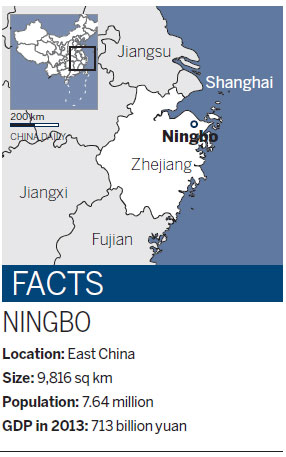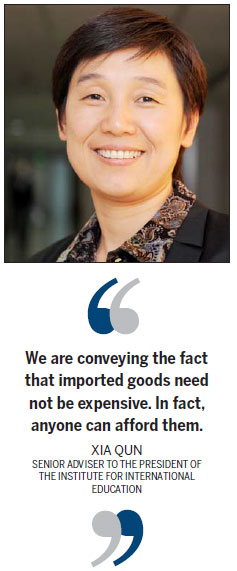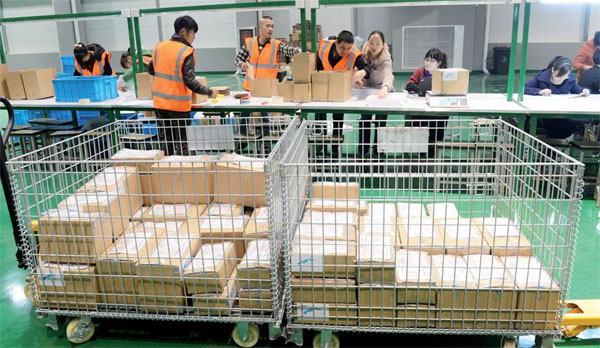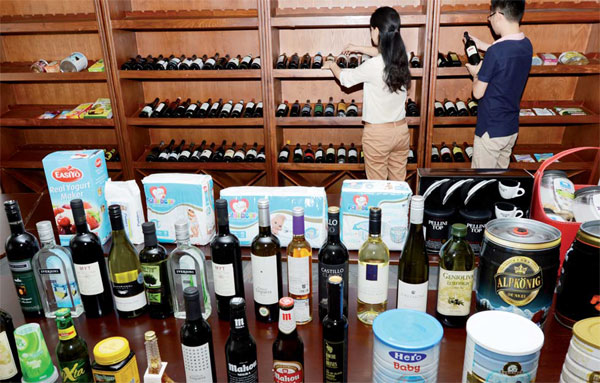Change of channel opens new market
Updated: 2014-07-11 07:26
By Yan Yiqi and Shi Xiaofeng (China Daily Europe)
|
|||||||||||
|
Workers pack goods for delivery in a warehouse in Ningbo free trade zone. Provided to China Daily |
|
Imported liquors and drinks are placed on shelves in stores in the free trade zone. Provided to China Daily |
Shoppers are the winners as city embraces novel way of buying goods on the Internet
Nothing but the best will do for Yao Mi's six-month-old son. For Yao, 27, of Hangzhou, Zhejiang province, that means catering to little Mantou's every need, including buying baby formula and nappies overseas.
Until recently the catch has been that because of the time needed for dispatch, transport and customs clearance, Yao and her son have had to wait for more than a month to receive goods ordered.
But this year, Yao discovered a new method of buying that can save her waiting time and money.
"It now takes only three days to receive the nappies, and it's 15 percent cheaper," she says.
One brand of nappies made in Japan sells at 170 yuan ($27; 20 euros) for 82 nappies through its official website, and until a few months ago Yao was paying just 140 yuan for them; through the new channel she pays 120 yuan.
The channel Yao uses is an e-commerce website that Ningbo free trade zone opened in November. Through it, Chinese residents can buy goods from overseas that are subject to relatively low taxes, that cost less to deliver and are delivered more quickly, and that include guaranteed quality and after-sales service.

The website, kjb2c.com, was set up following policy dispensations the central government granted Ningbo to operate the free trade zone. Companies registered in the zone can import goods and store them in a dedicated warehouse there without their having to go through customs. The goods are sold through the website.
Normally, imported goods are subject to import duty of at least 10 percent and value-added tax of 17 percent. Most imported goods sold through the website will only be subject to a personal baggage and postal tax of 10 percent, and goods that cost 500 yuan or less are allowed in duty free.
Since goods for which orders have been successfully placed will be in the warehouse in Ningbo, it takes only two to three days for customers anywhere on the Chinese mainland and in Hong Kong and Macau to receive the goods they order. If customers encounter quality issues, refunds can be granted within 30 days after purchase.
Chinese registered with the website who have produced identification, no matter where they are, can buy goods.
To prevent illicit purchases, if a person has bought an item that exceeds a daily limit, the customs office will automatically be alerted, and it will then begin investigating.
More than 500 kinds of goods from 18 countries are in or have passed through the free trade zone warehouse. By June 4, Ningbo Customs Office had reviewed 46,877 declarations of imported goods worth 15.06 million yuan. A total of 22,269 customers from 31 provinces, municipalities and autonomous regions and Hong Kong had bought goods through the website.
Yang Guoxun, vice-director of the Advisory Committee For State Informatization, says the e-commerce operation aims to standardize overseas purchases, called haitao in Chinese, which have become increasingly popular in China in recent years.
"The normal overseas purchase service is provided by individuals who are living overseas. They buy goods for customers in China and post them in packages. For customs offices, it is very difficult to charge duty on these packages. For the customers in China, it is hard for them to check the authenticity of the products, and there is no after-sales service."
A report published by China E-Commerce Research Center says overseas purchases for the Chinese market reached 76.7 billion yuan last year, an increase of almost 60 percent on the year before.
The cross-border service will become an important element of China's e-commerce industry, Yang says.
Last year, the total value of sales through China's traditional e-commerce was 1.85 trillion yuan, 42.3 percent higher than in the previous year.
With government policy support, the growth of cross-border e-commerce will soon outstrip that of overseas purchases, Yang says.
"After all, the website has official policy backing, and for customers it is a better shopping experience."
Ningbo is one of five cities granted the right to run such an e-commerce operation. The others are Chongqing, Hangzhou, Shanghai and Zhengzhou.
Xia Qun, vice-director of the administrative committee of the Ningbo free trade zone, says it has certain advantages over the other four cities.

"First of all, Ningbo has its own port, and it can handle large volumes of cargo. Ningbo-Zhoushan port is the world's largest port in terms of annual cargo throughput. We have a dedicated warehouse to store the goods and well-established logistics. On those things, cities such as Chongqing, Hangzhou and Zhengzhou can't beat us."
Six months after the Ningbo free trade zone opened, its e-commerce website ranked as No 1 among the five for volume, Xia says.
"By May 12, the five cities had transacted 60,000 orders for goods through cross-border e-commerce, and Ningbo accounted for 28,000 of them."
Another reason for Ningbo's success is that its services focus on fast-moving consumer goods such as nappies, milk, and infant formula, for which the tax rate remains at 10 percent. For luxury goods such as designer handbags, the personal baggage and postal tax can be as high as 50 percent.
"While Shanghai's operation sells luxury products, our focus is much more closely related to people's daily lives," Xia says.
"We are conveying the fact that imported goods don't have to be expensive. In fact, anyone can afford them."
Xia says she hopes this kind of e-commerce gives rise to a new kind of lifestyle in China.
"This year we aim to have sales revenue of more than 100 million yuan. And by the end of next year we expect revenue to exceed 2 billion yuan to make Ningbo the country's largest e-commerce base for fast-moving consumer goods.
Moximoxi.net is a website that has specialized in selling Japanese goods to Chinese customers since 2010. It became one of the 11 companies that operate through the Ningbo free trade zone e-commerce website.
Yin Haoran, Moximoxi.net's operations director, says that 20 percent of its revenue has come through kjb2c.com since it opened this year. It has taken 2.5 million yuan in revenue through the website and expects monthly sales to reach 2 to 3 million yuan by the end of this year, Yin says.
"Further down the track we see monthly sales revenue reaching 100 million yuan."
The platform has generated 40,000 more users for the company, half of whom have already placed orders, he says.
"For customers the biggest attraction is a sharp fall in shipping costs."
Through the traditional method of overseas shopping, customers are charged between 180 yuan and 200 yuan for shipping packages from Japan to China. With the Ningbo operation, those charges have in some cases all but evaporated, now being as low as 4 yuan.
The new mode is sure to account for a larger proportion of the company's sales revenue soon, Yin says.
"Apart from Japanese products, we plan to expand our business to cover products such as Australian milk and German cookware."
In April the e-commerce giant Alibaba Group signed a strategic cooperation agreement with Ningbo free trade zone. The zone will become a transfer hub for Alibaba. Many products sold through tmall.hk, an Alibaba operation dedicated to overseas products, will be directly delivered through the Ningo free trade zone.
Zhao Chen, director of tmall.hk, says the sheer size of the Chinese market is highly attractive to foreign suppliers.
"For many, using the cross-border e-commerce website is much more attractive than going to the expense of opening outlets in China to gain a presence in the market."
Zhao believes the free trade zone e-commerce will also attract foreign investment to China.
"Companies can register in China and move storage here, reducing shipping costs and time. Once they are here, they can turn to other channels such as chain stores, supermarkets and shopping malls. These kinds of investment are what cross-border e-commerce can bring not only to Ningbo but the country as a whole."
Zhejiang expects the value of trade through the province's cross-border e-commerce to reach $50 billion a year, 10 percent of its total foreign trade, Zhao says.
Contact the writers through yanyiqi@chinadaily.com.cn
(China Daily European Weekly 07/11/2014 page16)
Today's Top News
Germany wins World Cup on Gotze's brilliance
German suspect was not in contact with spies: US
Xi makes 'symbolic' stop in Greece
Baidu big winner in World Cup
Luxury car sales accelerate
Pianist Lang is on his game in Rio
School helps HIV students
$2.9 billion in gambling assets seized
Hot Topics
Lunar probe , China growth forecasts, Emission rules get tougher, China seen through 'colored lens', International board,
Editor's Picks

|

|

|

|

|

|







